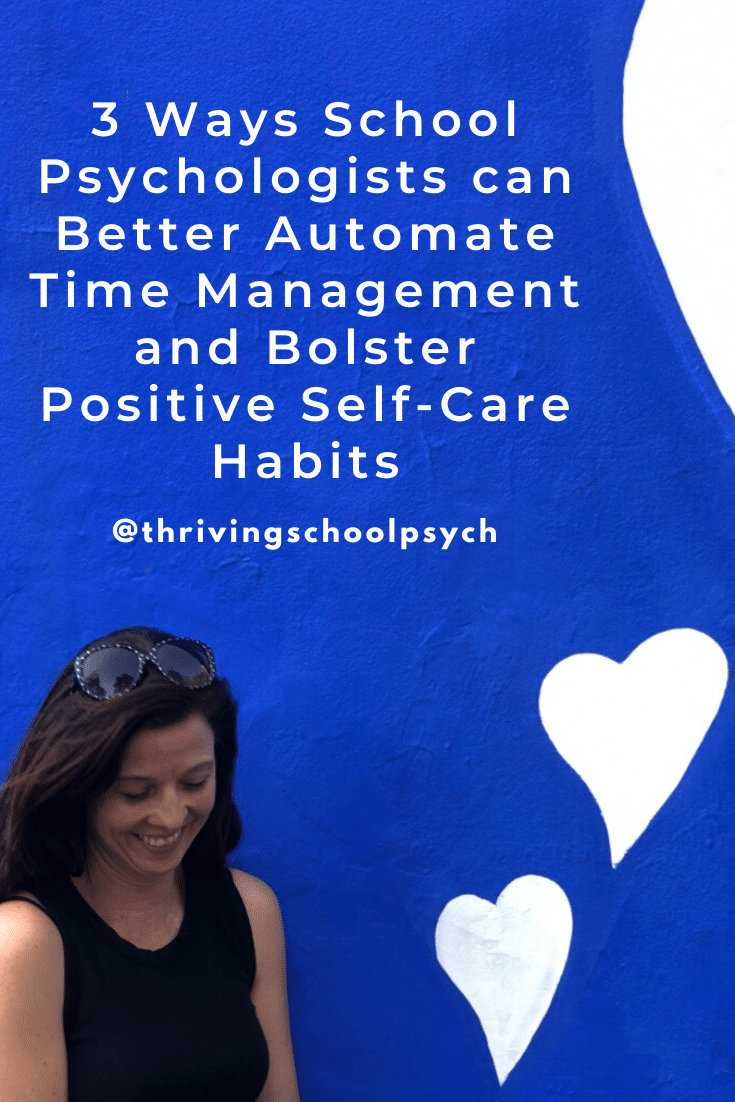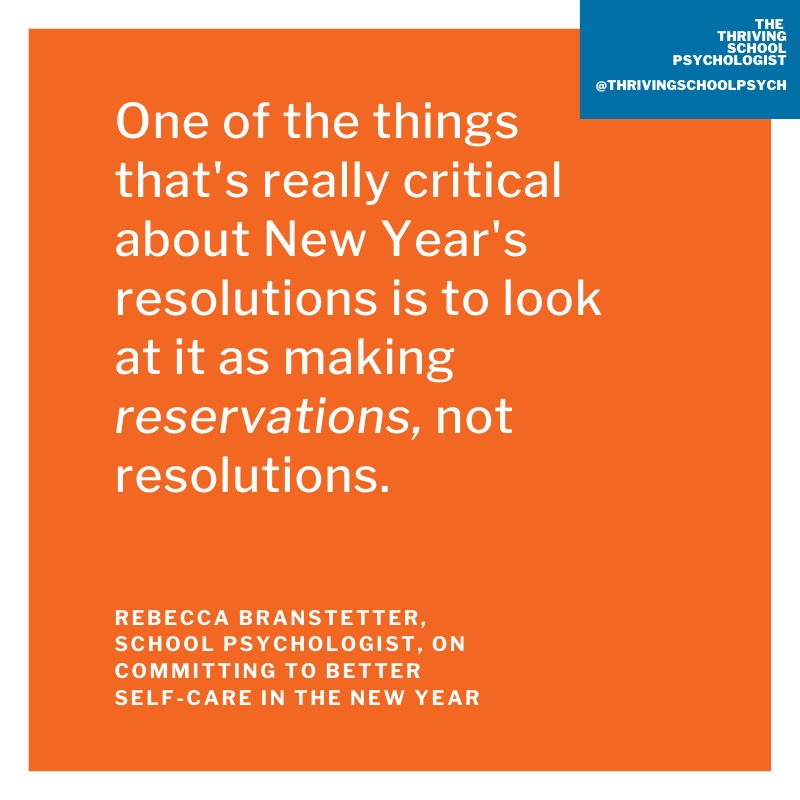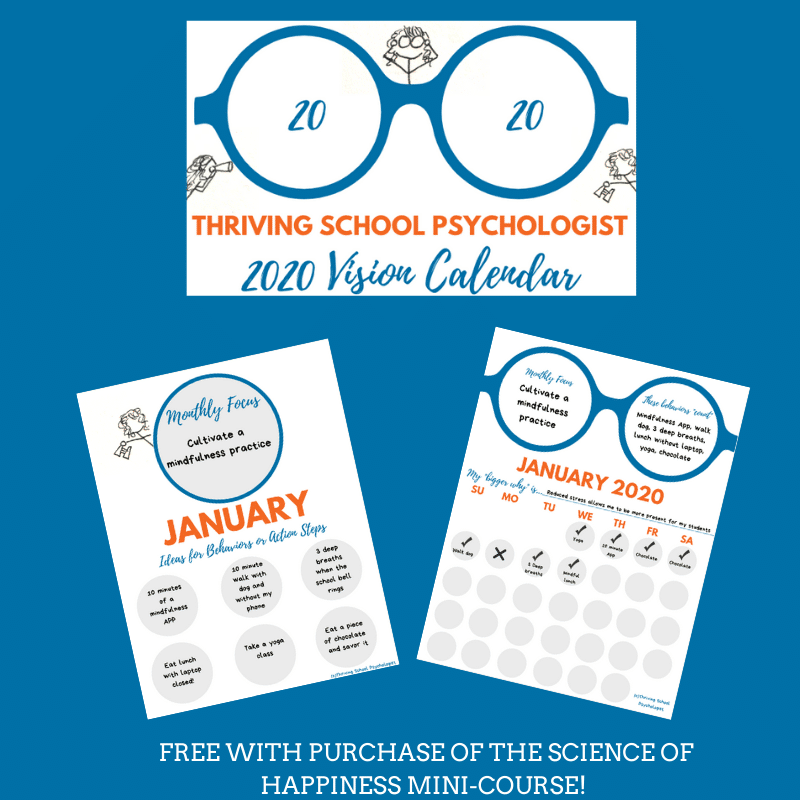Happy end of 2019 everyone! As you know, we’re entering a fresh new year, and its new year’s resolution time, so I’m sitting in my favorite coffee shop doing one of my favorite post-holiday resolution rituals – writing a positive behavior support plan for myself! I’m a total geek about things like this, so I got curious about what you guys are thinking about as far as cultivating positive habits and breaking negative habits in the new year.
To that end, I recently polled the Thriving School Psychologist community about their resolutions for the new year, and it turns out we all have very similar goals:
- We want to increase our joy and happiness at work as school psychologists
- We want to decrease the amount of stress that we have at work
- We want to cultivate a better work-life balance
So once the goals are set, what does moving towards achieving them look like?
First, it’s really important to understand the NUMBER ONE stressor of school psychologists. Are you ready? Drum roll, please. Time scarcity! It’s that overwhelmed feeling of not having enough time in the day to do what you want and/or need to do, or feeling like you don’t have enough time for yourself after work.
These constant feelings of time scarcity in their various iterations are some of the biggest happiness killers out there, and one of the antidotes to that is being proactive about gaining control over your time.
Obviously, this is one of those things that falls squarely under “easier said than done” – how do we create more time for ourselves, and how do we cultivate self-care habits? You know I’m here to help, so I’m going to share with you three ways to better automate your time management and bolster positive self-care habits!

1. Knowing what’s burning you out and what is suppressing your happiness.
If you’ve watched my videos before, you know that I have a “Four Pillars of a Thriving School Psychologist” model, and one of the pillars is understanding the science of burnout prevention. It’s a little bit different for school psychologists than for the general community, but there are also some similarities. It’s about recognizing the signs of burnout, and on the flip side, understanding the principles of happiness that cultivate joy in our jobs as school psychologists. So, if you’re in the Thriving School Psychologist Collective (my year-long online course), you already know this is embedded in everything we do and what we’re doing all day long in the course – we’re cultivating those positive self-care habits, and we’re increasing our time management strategies.
Now, if you’re not in the course, I’ve distilled ten of those principles into my mini-course, which is called “The Science of Happiness.” In this course, I look at the research around what increases happiness on the job, and then I apply it to what you can do on a daily basis as a school psychologist. So, if you haven’t already, check out the Science of Happiness mini-course to further help you with cultivating happiness, self-care, and improving your time management skills.
2. Focusing on your bigger identity and also your bigger why.
What does that mean? It means that a lot of times when we set goals, we set goals based on the desired outcome – like, “I’d like to not bring work home on the weekends,” or “I’d like to finally start that student counseling group that I have a passion for.” We focus on the end result, but one of the things that’s really interesting, (and I’ve been geeking out a lot on the science of habit formation) is that we’re more likely to achieve our goals if we link them to our identity. So what that means for goal-setting is thinking “I’m the type of person who…” If you can, fill in the rest of that sentence with “I’m the type of school psychologist who makes time for things that are important to me” or “I’m the type of school psychologist who doesn’t take work home on the weekends.”
When you tie your goals to your identity, you’re more likely to follow through, and the same happens when you tie goals to your bigger why – asking yourself why you want to achieve these goals? Why am I setting a goal to work out? Well, I want to feel better. I want to be healthy. I want to be around for my kids as long as possible. These things will help you stick with those goals, so think about the person you want to be, and then set your goals to match that. Every time you reach one of those goals, it’s such great positive reinforcement (“I’m that type of person!”) and it emboldens you to keep moving forward.
This last one may be a surprise, but it may not – are you ready for a truth bomb about resolutions?
3. Knowing that broken resolutions are not due to lack of motivation.
Nope. Instead, they’re due to lack of clarity. Did you know that 80 percent of New Year’s resolutions are broken by February? EIGHTY PERCENT. You’ve seen it – if you go to the gym regularly, you know that in January, it’s totally packed, and then by February, everyone’s gone. Is the mass exodus because everyone lost motivation? They all decided that they didn’t want to get more fit or feel better? Of course not. Instead, it’s a lack of clarity – the details of why they’re trying to achieve this goal, and a plan for how to achieve it – that really holds people back.
One of the things that’s really critical about New Year’s resolutions is to look at it as making reservations, not resolutions – meaning that we need to set an intention and then be really clear about how we’re going to honor those intentions. There’s a thing called intention implementation, which is simply saying to yourself “I’m going to do this.” Just doing this has been shown to make you two to three times more likely to actually do it.

How School Psychologist Can Make “Reservations” for Better Habits in 2020
Are you ready? Do you want to set an intention to decrease your stress and increase your joy and happiness at work? Well, here’s the first step. I’ve created a tool for you based on the three principles I talked about, and on the research of happiness, the research of identity and the bigger why, and on the research of habit formation. It’s essentially a behavior support plan for ourselves targeted towards just these principles. It’s a year-long calendar tailored towards your goals and a way to track them, and it’s all based on the science of happiness and habit formation!

👉If you’re already an active member of the Thriving School Psychologists Collective, or an active member of the Thriving School Psychologists Alumni Lounge, you’ll get this tool for FREE in your learning portal (I’ve just sent out an email about that!). The calendar is a really great way to turn the principles you’re learning in our year-long course into action items, and track your progress along the way.
👉If you’re not a member of the Thriving School Psychologists Collective year-long online course, you still have an opportunity to utilize this tool. If you would like to purchase the Science of Happiness Course, from now through January 15, 2020, you will get this calendar as a FREE BONUS, so head over to the website and click on the link to purchase!
I look forward to seeing you all make reservations, not resolutions, with me, setting your intentions and actually keeping up with your New Year’s resolutions past February! I hope you’re enjoying your break, and can sit down with a cup of coffee and your own post-holiday ritual to set yourself up for a happy and successful 2020!
🥂Cheers to a HAPPY New Year,
Rebecca
